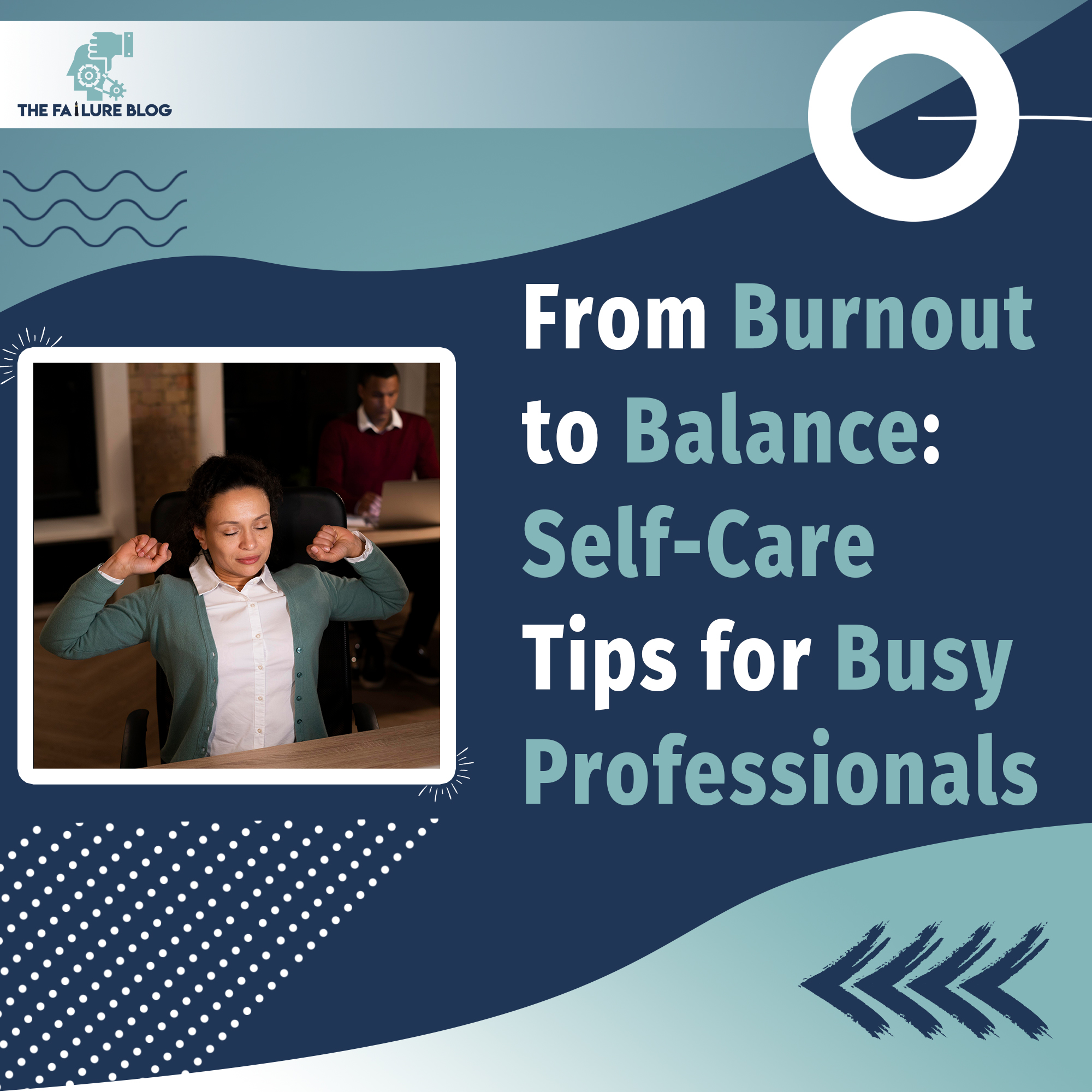
In our modern, high-speed world, the pressures of professional life often leave little room for personal care. The constant juggling of tasks, meetings, and deadlines can take a toll on your mental and physical well-being, leading to burnout. This phenomenon is not just about feeling tired; it manifests as a deep sense of exhaustion, cynicism, and inefficacy that can drain your enthusiasm for work and life.
Burnout affects not only your productivity but also your overall quality of life. The key to overcoming this challenge is to adopt effective self-care practices that help you reclaim balance and enhance your well-being. By making small yet impactful changes in your daily routine, you can move from a state of burnout to one of balance and rejuvenation. Here’s how busy professionals can navigate this transition and thrive both in their careers and personal lives.
Recognize the Signs of Burnout
Before tackling burnout, it’s crucial to identify its symptoms. Feelings of exhaustion, cynicism about work, and reduced professional efficacy are tell-tale signs. When you notice these red flags, it’s time to act.
Prioritize Restful Sleep
Sleep is a cornerstone of good health. Quality sleep restores your body and mind, preparing you for the next day’s challenges. Create a bedtime routine: dim the lights, turn off electronic devices, and unwind with a book or relaxing music. Aim for 7-9 hours of sleep each night to ensure you wake up refreshed and ready to tackle your day.
Practice Mindfulness and Meditation
Mindfulness and meditation can significantly reduce stress. These practices help you stay present, improve concentration, and foster a sense of calm. Start with just five minutes a day. Apps like Headspace and Calm offer guided meditations perfect for beginners. Over time, you’ll find that these moments of stillness can transform your approach to daily challenges.
Stay Active
Physical activity is a powerful stress-buster. Exercise releases endorphins, the body’s natural mood lifters. Whether it’s a morning jog, a yoga session, or a dance class, find an activity you enjoy. Even a short walk during your lunch break can boost your energy levels and clear your mind.
Set Boundaries
In a hyper-connected world, it’s easy to feel like you must always be available. Setting boundaries is essential to maintain balance. Communicate your work hours clearly to colleagues and stick to them. Use tools like Do Not Disturb mode on your devices to disconnect from work during personal time.

Delegate Tasks
You don’t have to do everything yourself. Delegation can lighten your load and empower your team. Identify tasks that others can handle and trust them to do so. This not only reduces your stress but also fosters a collaborative work environment.
Nourish Your Body
What you eat directly affects how you feel. Opt for a balanced diet rich in fruits, vegetables, lean proteins, and whole grains. Stay hydrated by drinking plenty of water throughout the day. Avoid excessive caffeine and sugar, as they can lead to energy crashes and mood swings.
Take Breaks
Working non-stop can lead to diminishing returns. Regular breaks enhance productivity and creativity. Use techniques like the Pomodoro Technique, which involves working for 25 minutes and then taking a 5-minute break. These intervals can keep your mind sharp and focused.
Connect with Others
Social connections are vital for mental health. Spend time with family and friends, share your thoughts, and listen to theirs. If you’re feeling overwhelmed, don’t hesitate to seek support from a professional counselor or therapist. Sometimes, just talking about your stress can significantly alleviate it.
Pursue Hobbies and Interests
Engaging in activities you love outside of work can rejuvenate your spirit. Whether it’s painting, gardening, reading, or playing a musical instrument, make time for your passions. These activities provide a creative outlet and can be incredibly fulfilling.
Learn to Say No
Overcommitting is a common trap for busy professionals. Learning to say no is crucial for maintaining balance. Assess your commitments and prioritize those that align with your goals and values. Politely decline tasks or events that don’t fit your schedule or add unnecessary stress.
Plan and Organize
Effective time management can prevent overwhelm. Use tools like planners, to-do lists, or digital apps to organize your tasks. Prioritize your responsibilities and break them into manageable chunks. Planning your day helps you stay on track and reduces the anxiety of last-minute rushes.
Invest in Self-Care Activities
Self-care isn’t a luxury; it’s a necessity. Schedule regular activities that nurture your well-being, like massages, spa days, or simply a long bath. Self-care rituals can recharge your energy and improve your overall outlook on life.
Continuous Learning and Growth
Engaging in continuous learning keeps your mind active and engaged. Whether it’s taking a new course, reading a book, or attending workshops, investing in your personal and professional development can be incredibly satisfying. It not only broadens your knowledge but also opens new opportunities and perspectives.
Maintain a Positive Mindset

Your mindset plays a crucial role in how you handle stress. Practice gratitude by focusing on positive aspects of your life and work. Start a gratitude journal to remind yourself of things you’re thankful for. A positive outlook can enhance resilience and help you navigate challenges more effectively.
Utilize Technology Wisely
While technology can streamline tasks and improve efficiency, it can also contribute to burnout if not managed properly. Use productivity apps to stay organized but set limits on screen time. Tools like blue light filters can reduce eye strain during long hours at the computer.
Seek Professional Help When Needed
Sometimes, professional intervention is necessary. If you’re experiencing severe burnout, a mental health professional can provide strategies and support to help you recover. Don’t hesitate to seek help when you need it; taking care of your mental health is paramount.
Final Thoughts
Balancing work and personal life is a continuous process. By incorporating these self-care tips, you can create a sustainable routine that promotes well-being and productivity. Remember, the key is to listen to your body and mind, and make adjustments as needed. Taking proactive steps towards self-care can transform your professional and personal life, helping you move from burnout to balance.





Leave a Reply